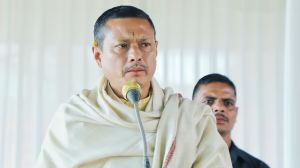Corruption eroding fabric of our nation… must be tackled urgently
Why Karnataka is cited as example.
There and in MP,Lokayukta is vigilance authority with a dedicated police force. Heres how Lokayuktas work in some of the states that have appointed one.
Karnataka
since 1986,when Karnataka replaced its vigilance commission with the Lokayukta,the latter has earned a reputation as one of the countrys most effective institutions in tackling corruption,thanks largely to the initiative of two retired judges who have held that position in the last decade N Venkatachala and current incumbent Santosh Hegde.
A special police unit works under the Lokayukta. All powers for investigating and prosecuting corrupt government servants are vested with the Lokayukta police.
Venkatachala,appointed by the Congress government of 1999-2004,personally led raids on officials under provisions of the Prevention of Corruption Act ,1988. This was despite court judgments that the Act can be enforced only by police. Though hundreds of officials were publicly caught taking bribes,few were prosecuted.
In contrast,Hegde,appointed by the JDS-BJP government in August 2006,appears in public only after his police have completed raids and arrests. He has assembled a crack police team and given his office more credibility by taking the battle to ministers,elected leaders,and IAS and IPS officials. BJP MLA N Sampangi was trapped in 2008 accepting Rs 5 lakh to address concerns of a resident of his constituency. Katta Subramanya Naidu,though powerful,was forced to resign as IT Minister last year after Lokayukta investigations revealed his involvement in a land scam.
Last September,the BJP government moved to give the Lokayukta suo motu powers to prosecute class-I officers including bureaucrats,but left politicians out of its purview. The government has,however,proposed that the Lokayukta must first tell the government in writing of the grievance/allegation on which they want to start suo motu investigation.
The Lokayukta has powers to address corruption issues involving government servants up to the Chief Minister. It needs government clearance to punish such officials something rarely accorded.
Madhya Pradesh
The Lokayukta office replaced the state vigilance commission in 1982. The Lokayukta is assisted by a deputy and has the authority to investigate complaints against all public servants except the Assembly Speaker,the Deputy Speaker and judicial officers. The deputy Lokayukta can hear cases involving officers in corporations,vice-chancellors,registrars and cooperative societies. Under the Lokayukta is a Special Police Establishment (SPE) headed by a director general of police,assisted by two IGs and an SP. Besides the Bhopal headquarters,the Lokayukta has seven divisions,each headed by an SP. There are 26 deputy SPs,seven special public prosecutors,41 inspectors and about 150 of ranks deputy inspector and below. Not many posts are vacant. The Lokayukta and the deputy Lokayukta are vested with powers under the Evidence Act and the CrPC for conducting investigations. All proceedings before them are deemed to be judicial; both are considered courts under the Contempt of Court Act.
Uttar Pradesh
In a state where the Chief Minister recently dropped a minister (Rajesh Tripathi,homeopathy and religious endowments) after the Lokayukta had found him guilty of irregularities,the Lokayukta still wishes he had a dedicated team of investigators. His office has only three police officers of DSP rank and three judicial officers of additional district judge rank to investigate them,says Lokayukta N K Mehrotra.
Of the governments six anti-corruption agencies,none reports to the Lokayukta. If we ever ask any of them to conduct an investigation,they say they need a government direction, Mehrotra said. The Lokayuktas office has been demanding judicial powers and infrastructure to match those in MP and Karnataka.
Orissa
Orissa in 1970 became the first state to start the Lokpal-Lokayukta system but the law was repealed in 1992 by the Biju Patnaik government. The institution was revived in 1995 and the law amended in 2005. It provides for a Lokayukta with the same powers as that of a Lokpal but Orissa has always had only a Lokpal discharging the function of both. The Lokpal has no investigation wing,and the state vigilance department does not report to him,but he can ask the government for vigilance officials to help him in an investigation; they would then report to him. The Lokpal cannot act against anyone on his own; if his recommendations are not carried out,he can send a report to the Governor.
Punjab
Punjab has a Lokpal rather than a Lokayukta; the vigilance bureau does not report to him. The bureau works independently under the Chief Secretary. The first Lokpal was appointed in 1995 but it was only recently that draft rules defining his role were sent to the government for final approval. The position has frequently been vacant for long periods. The present Lokpal,former judge D S Dhaliwal,is short of staff to deal with complaints. Around 60 complaints are pending as there are no officers. About 70 complaints have been investigated and recommendations sent to the Governor,who forwarded it to the government,but the government took no action. Complaints mostly deal with selection and service matters,but some have been against ministers and other politicians, said a member of the Lokpals staff.
Haryana
The vigilance bureau does not report to the Lokayukta. He can look into complaints against any public servant,including the Chief Minister,but it is up to the government to act on his recommendations. The Lokayukta can ask any public servant to produce records pertaining to a specific matter within a specified time. N K Sud,who retired as Lokayukta this month,calls it a toothless body. He has since been succeeded by Justice Pritam Pal. Sud too cited the cases of Karnataka and MP. At a meeting with the Prime Minister and the President,the Association of Lokayuktas had recommended a Central law to ensure uniformity in the functioning of such offices.
Maharashtra
It has both a Lokayukta (a retired judge) and an Upa-Lokayukta (a retired IAS officer) but their powers are limited. The Lok Ayukta has no jurisdiction to investigate action by a public servant in certain cases,such as action taken for investigating a crime; appointments or salaries; grant of awards; and if any alternative tribunal or court exists to redress a certain grievance. The Lok Ayukta has no jurisdiction to investigate commercial relations between a public servant and contractors,and cannot intervene if any action has been taken with the approval of a judge,the chairman of the Maharashtra Public Service Commission,the Chief Election Commissioner of the state,the Speaker of the Assembly or the Chairman of the Legislative Council. The office receives about 12,000 complaints a year. The Anti-Corruption Bureau of the state police reports not to the Lok Ayukta but to the state police chief. At times,it co-operates with the Lok Ayukta if the two are working on a case together or the Lok Ayukta asks it for assistance.
(Inputs: Johnson T A,Milind Ghatwai,virendra nath Bhatt,Debabrata Mohanty, Harpreet Bajwa, Rajendra Khatry,Rakshit Sonawane)



- 01
- 02
- 03
- 04
- 05




























